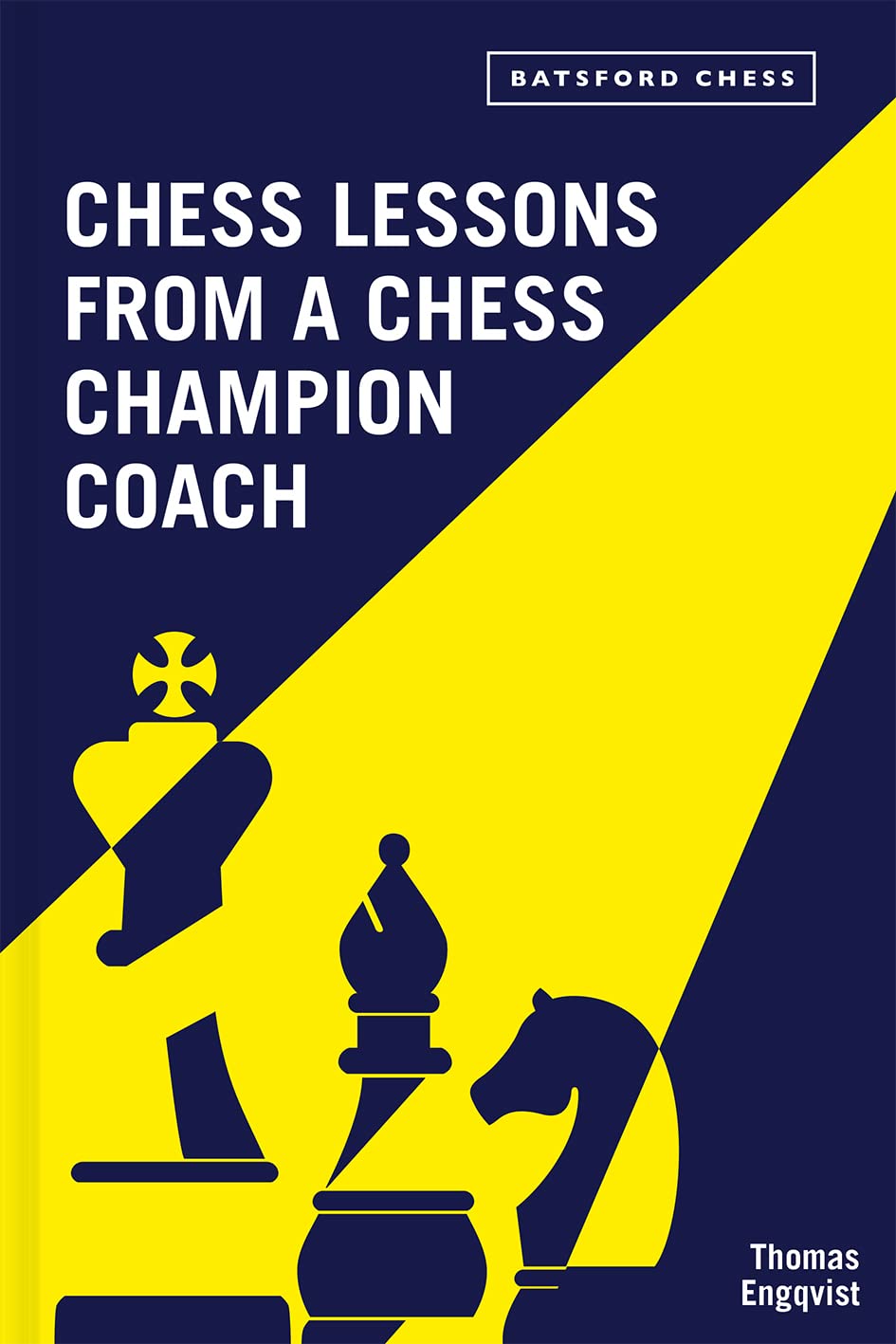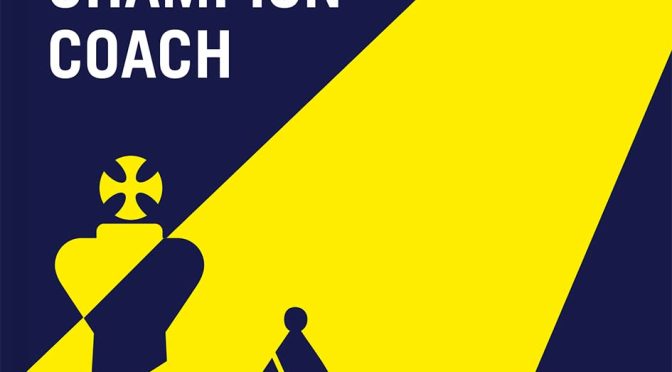From the Batsford web site:
Lessons, motivation and coaching to make you a better chess player.
In an ideal world, any aspiring chess player, at almost any level, would get better with a coach. If that’s not possible, having chess champion coach Thomas Engqvist’s book at your side is the next best thing.
In his series of lessons, Engqvist guides you through not only the most important elements of chess to master but also the psychology, how to marry knowledge with imagination, and how to stay motivated.
Suitable for older children through to adults, the lessons are drawn from chess games through history, from the 16th century to Magnus Carlsen and latest Alpha Zero computer chess. (Reviewer’s note: it doesn’t actually include Alpha Zero, stopping at Carlsen.) It features a range of key players, including Steinitz, Lasker, Nimzowistch, Botvinnik (Soviet chess school), and Fischer. With clear and accessible annotations to give clarity, the games highlight the most important lessons to learn and, just as importantly, how to ‘practise’ chess.
International Master Thomas Engqvist has travelled the world teaching and coaching chess to a very high level for decades – and with this book, he can be your coach too.”
About the Author (updated from the publisher’s website):
“Thomas Engqvist is an International Master from Sweden. He has 45 years’ experience as a chess coach and teacher. He has worked with players at world championship level in both junior and correspondence chess. He is the author of 300 Most Important Chess Positions, 300 Most Important Tactical Chess Positions and 300 Most Important Chess Exercises, all published by Batsford.

From the back cover:
Chess Lessons from a Champion Coach gives you the opportunity to assimilate the most important chess principles and concepts by following a study plan based on key encounters by over 30 great players.
With lessons from more than 60 instructive games in chronologically arranged chapters, this is the perfect guide for players who want to gain a broad knowledge of chess history and its evolution, but don’t have time to spend hours in what can be unproductive reading.
Featured in each chapter is a highly influential grandmaster who has played his part in developing chess into what it is today. There can be no more enjoyable way to improve your own play than to absorb your personal coach’s explanatory commentaries to exemplary games of past and present chess heroes, including Magnus Carlsen. In this way centuries of accumulated understanding of chess can be learned in just a few weeks.
By adopting the same tactics and strategies as demonstrated by these champions, you can also keep track of your own chess development by comparing it with the overall historical development of chess – and climb the ladder to success.
Swedish International Master Thomas Engqvist has approximately 45 years experience as a chess coach, teacher, writer and player. He has successfully worked with players at world championship level in both junior and correspondence chess.
What we have here is a book covering the history of chess ideas in chronological fashion, starting with Ruy Lopez and finishing with Magnus Carlsen. It’s hardly an original idea: the first book of this type was Richard Réti’s Masters of the Chessboard, and there have been quite a few others since then: off the top of my head I’ve reviewed a couple of them here myself. The second Chess Heroes: Games book will take a similar approach (using some of the games from Move Two!), but pitched at a much lower level.
I’d say from the outset is that if you’re knowledgeable about the subject, and have read similar books before, you’re probably already familiar with many of the games displayed by Engqvist here.
But if you’re a club standard player with little knowledge of the history of your favourite game you should certainly read on.
Most of the subjects are represented by just one game, so we quickly whizz through the likes of Greco (‘the first tactical player’), Philidor (‘the first positional player’) and even Morphy until we reach Steinitz (‘the scientific player’), the first of four players to be considered in rather more detail.
According to Engqvist:
The basis of Steinitz’s teachings is to construct a plan which is in accordance with the requirements of the position. These requirements could be an advantage in development, a strong centre, open files etc. One should gather such advantages, one by one, as preparation for an attack. This is the so-called theory of accumulation.
This theory is demonstrated by the following game. As always, click on any move for a pop-up window.
Engqvist adds after the game:
This is why such classic games are much more instructive than modern games. Steinitz’s opponents didn’t realise or didn’t want to realise what he was doing, whereas today’s more knowledgeable players do know – because they have studied such “one-sided” but very instructive classic games.
You might disagree – but I don’t.
Lasker (‘pragmatism and psychology’), the star of the next chapter, also receives special treatment.
In this instructive game, where he defeats Rubinstein’s IQP, he uses the ‘pivot square’ d5 in a variety of ways.
It is indeed a game to be understood in depth and learned by heart, because the idea of a pivot being a source of energy can be used in an untold number of situations.
Engqvist quotes Nimzowitsch’s comments on this game with approval, and makes it very clear throughout the book that Nimzo is one of his chess heroes.
Although he only gets one game (yes, it’s the Immortal Zugzwang game), the author has this to say:
Nimzowitsch is just as important as Steinitz, since his principles do complement those of his predecessor, However, to appreciate Nimzowitsch’s precepts in depth one needs to also properly understand Steinitz’s classical principles, otherwise the true meaning of Nimzowitsch’s theories will be lost.
and:
In my opinion (reading Nimzowitsch) is much more important than learning from computers, which are very bad teachers indeed, and sometimes incomprehensible. Nimzowitsch must be regarded as one of the greatest, if not the greatest ever, teachers…
Controversial, perhaps, and you might well think he’s overstating his case.
The other two subjects awarded more extensive treatment are, predictably, Capablanca (‘The Chess Machine’) and Alekhine (‘The Complete Chess Artist’).
From then on it’s just one game each, even for giants such as Botvinnik, Fischer, Karpov and Kasparov. right the way through to Carlsen.
Here’s the game used to illustrate Fischer (‘The Aggressive Classical Player’).
Engqvist:
This game is one of Fischer’s best and it is remarkable that he was only 16 years old when it was played. It proves that he was a genius. The good news is that Fischer’s style is possible to emulate, because it it largely based on positional technique à la Capablanca, which to a high degree can be learned.
It’s clear from this book, as well as from the author’s earlier volumes, that Thomas Engqvist is an exceptional writer, teacher and annotator. He has also made extensive use of a wide range of secondary sources (but, sadly, he fails the Yates test: he was Fred (Dewhirst), not Frederick Dewhurst). Each chapter is prefaced by a series of quotes by or about its subject, which in itself makes fascinating reading. Computer analysis has been used to correct analytical errors made by earlier authors, but this is done judiciously: he doesn’t go over the top in providing reams of engine generated variations. You might, I suppose, disagree with some of his views, especially on Nimzowitsch, but that’s part of the enjoyment you’ll get from the book. You might also think there’s some simplification and generalisation, but that’s inevitable in a book of this nature.
The production values are, of their type, excellent. The book, like others from this publisher, has a reassuringly old-fashioned look about it. While younger readers may well prefer something glossier and glitzier, it’s not likely to be a problem for those, like me, of the Batsford generation.
Many publishers these days prefer more interactivity, with puzzles at the start of each chapter, or, with annotated games, stopping every few moves to ask you a question. There’s none of that here, just solid, accurate and instructive comments. Different readers will prefer different styles of annotation. The one concession to interactivity is a couple of quizzes with questions like What was Ponziani’s opinion of the theories of Philidor and del Rio?, which I could really do without as they’re testing memory rather than understanding.
I had two other thoughts when reading this book. I often wonder whether chess authors are writing the book they wanted to write or the book the publishers thought would sell. Perhaps I’m mistaken, but my impression was that Engqvist really wanted to write something like The 60 Most Instructive Positional Games rather than a book with a historical perspective offering, for the most part, one game per star player.
I also wonder what exactly the market is for this book. Younger readers, if they want a book at all, might prefer something with a more modern feel, while older readers might have seen many of the games before.
But, if you’re, say, 1500-2000 strength, you’re serious about improving your chess and you’re happy with the style and contents, you won’t go wrong with this excellent book from one of the best authors and teachers around.
Richard James, Twickenham 14th February 2024

Book Details :
- Paperback: 312 pages
- Publisher: Batsford; 1st edition (13 April 2023)
- Language: English
- ISBN-10:1849947511
- ISBN-13:978-1849948043
- Product Dimensions: 15.04 x 2.01 x 23.04 cm
Official web site of Batsford



One thought on “Chess Lessons from a Champion Coach”